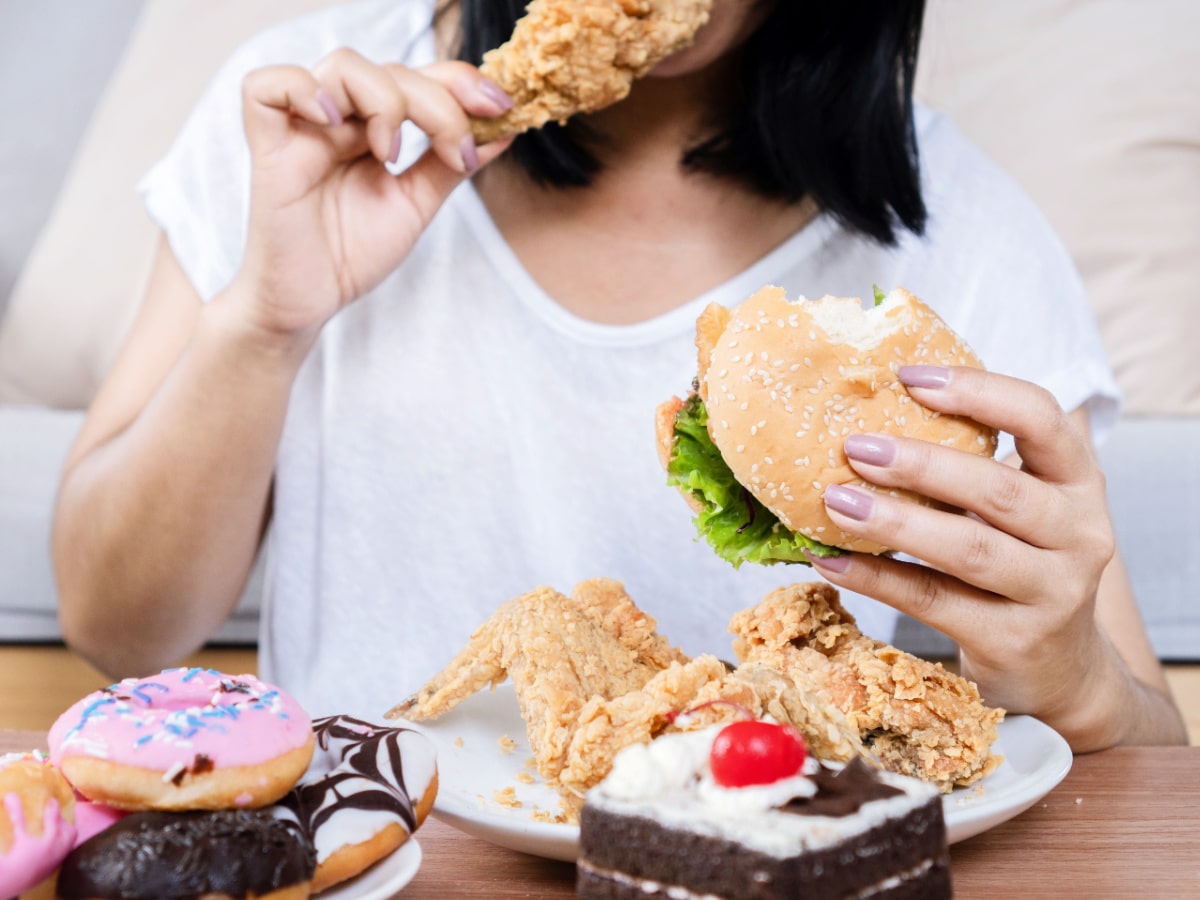Table of Contents
Eating a bit too much at a family gathering, or snacking on some chocolate biscuits in the evening, is something we’ve all done at one point or another. While there’s nothing wrong with a break from the norm every now and then, indulging the appetite too much can be quite an issue. Whether it be overeating at an office party, or ordering too much from your favourite takeaway, the result is always the same. Bad feelings, a resolve to never indulge again, and a break in this resolve for one reason or another.
But why does this cycle happen? Why is it so difficult to break? Is it even possible? These are all questions we ask ourselves after a binge eating episode, and are questions we aim to answer in this article. In the end, you’ll know that beating binge eating is entirely possible, and exactly how to do it.
Understanding overeating – how appetite works
Although it might seem like a distinction without a difference, overeating is caused by our appetite, not by hunger. This is the key to understanding overeating; hunger is our body’s signal for nutrients, while appetite is our desire to eat. In other words, hunger is our need, while appetite is our want.
While appetite and hunger are very different, they do come from the same place. The brain releases feelings of hunger to get your body what it needs, while the urge to fulfill desires comes from the very same source. Both are connected to the neuroendocrine system, and the close connection can make it exceptionally difficult to identify whether we feel hungry, or simply desire our favourite food. This is ultimately what leads to those late-night snack binges or regular excessive orders from a takeaway.
Our appetite will typically lead us to junk food for a reason. This reason is to load up on quick energy or certain very specific nutrients. Foods high in sugar and fat content are particularly appealing to the appetite, harkening back to humanity’s days of old when such foods were exceedingly rare. A drive to indulge in sugar-rich fruits and the like were useful back then, but now you can get fast food on every street corner, this drive can be quite detrimental. In fact, this drive can lead us to a habit of overeating, causing health issues down the line. To prevent this, knowing the two types of hunger, homeostatic and hedonic, is vital.
Types of hunger – homeostatic and hedonic
Understanding the difference between homeostatic and hedonic hunger can help you to regain control over your eating habits. Thankfully, the difference is pretty simple. Homeostatic hunger is our bodies’ response to a lack of energy or nutrients, which results in feelings of hunger that steadily progress until we can’t ignore it. This form of hunger stops quite quickly once we start eating, and doesn’t typically require substantial amounts of food to sate.
Hedonic hunger, on the other hand, does not stem from a requirement for food, but rather a desire for pleasure. This leads us to want junk food, given the pleasurable ingredients they contain. With the difference between the two types of hunger outlined, it might seem easy to ignore feelings of hedonic hunger and respond to feelings of homeostatic hunger. However, hedonic hunger has a nasty trick up its sleeve; it arrives incredibly quickly, and almost always feels quite intense. This might make it more obvious to tell which kind of hunger you’re feeling, but it also makes hedonic hunger harder to resist.
Also Read: 6 Reasons To Lose 3 Stone
The reasons behind binge eating
Given the clear difference between homeostatic and hedonic hunger, it might seem easy to simply ignore one and answer the other. Well, it isn’t quite so simple, as anyone who has experienced hedonic hunger can attest to. When that extra slice of pizza starts to look enticing, it tends to only end one way. But why is this, and what is the root cause behind hedonic hunger?
There are four core reasons why someone might feel hedonic hunger. Sometimes one will be the cause, while other times it could be the work of multiple. In any case, solving your binge eating problems hinges on understanding why the temptation exists in the first place.
Genetics
Our genetics play a key role in how the various systems within our bodies work. In the context of overeating, our genetics can make us lean towards using food for pleasure, or against it. This may or may not seem a surprising claim, but evidence suggests that our genes can be the root cause of overeating. Specifically, several studies have drawn a link between adiposity, or the accumulation of fat tissue, in children and obesity in the family. Genetic influences have also been linked to loss of control, or binge eating, episodes.
Psychology
Along a similar vein as the previous reason, our psyche can influence whether we can resist the temptation of the biscuit or cave to it. This can be due to two reasons – a genetic predisposition or an experience that affects our mental state.
In the psychological sense, our genetics could be the root of an addictive personality, for example. While addictive personalities are more often associated with drug addiction, they can be behind gambling, eating, and other forms of addiction. Although not always the case, these addictive personalities can be the result of our genetics.
Our mental health is the second potential psychological factor. For example, poor sleeping habits can result in our bodies craving additional energy throughout the day, which often means a few more chocolate bars than is good for us. Stress can also influence weight gain, both in terms of our bodies’ ability to digest food, and the types of food we desire. It’s a lot harder to resist our favourite fast food when we’ve had a particularly tough day at work.
Environmental
Our nature isn’t the only potential cause of overeating. Our environment can play a massive role, both in terms of our cravings and our eating habits, more generally. Environmental influences can be quite varied, however. These influences could be anything from watching TV while eating, causing us to switch off and not pay attention to our bodies’ cues, to overeating at a social event. Indulging at a social event is easy to do, especially if everyone else is doing the same.
Binge-eating disorders
A mixture of the previous influences can coalesce into a very serious problem – binge-eating disorders. Binge-eating disorders are an unfortunate reality, and can be a difficult obstacle to overcome, especially if you don’t know much about them or how to address them. A binge-eating disorder can be the result of genetics, with research indicating a link between a family history of binge eating, and an individual developing binge eating habits at some stage in life.
A binge eating disorder can also be influenced or outright caused by psychological factors. Some suffering from a binge eating disorder may have a genetic predisposition to use food for comfort, much the same as others might turn to drugs, alcohol, or other substances and behaviours. In periods of high stress, this latent quirk in an individual’s psyche can make itself known, effectively causing a binge eating disorder as a coping mechanism. Over time, this will cause an individual to develop a very unhealthy relationship with food, and potentially make binge eating the norm. This can be a tough habit to break, especially without the necessary support, but it is an essential battle for the sake of your health.
Also Read: Understanding Emotional Eating
How to curb overeating
Caving to your cravings is never pleasant, but you aren’t powerless to stop the cycle. While it will take some effort and determination, keep our tips in mind next time you catch yourself reaching for the biscuit tin. In time, you’ll regain control over eating habits, and improve your health, too.
Know your appetite
As we’ve stressed so far, knowing the difference between homeostatic and hedonic hunger is paramount. Mistaking hedonic hunger for a genuine need for food likely will lead to overeating, and certainly makes it easier to load up on junk food.
We’ve already mentioned some tell-tale signs of hedonic hunger, but ultimately, it will vary from person to person. For a better way to tell hedonic hunger from homeostatic, you should consider why you’re tempted to eat in the first place. If you’re tempted to eat on the run-up to exams or after a stressful workday, you might be experiencing hedonic hunger. On the other hand, eating in response to a growling stomach is probably homeostatic hunger.
Create a healthy food environment
Creating a healthy food environment is a good way to reduce cravings and feelings of hedonic hunger. Your food environment is made up of two parts – your social environment, and your eating environment.
Overeating in a social setting is easy to do. It’s difficult not to follow suit with other people, and if those people enjoy larger portions, you’ll often find yourself doing the same. It can be helpful to be around people with the same goal of curbing overeating, or people who can give you a helping hand. Steering clear of certain venues, such as an all-you-can-eat buffet, is also a good idea.
Removing distractions from your eating environment is the other side of the coin. Switching off the TV and putting your phone away can help you focus on your food properly. Savouring your food slowly can help increase feelings of fullness, and reduce feelings of hunger later on in the day. Serving your food on a smaller plate can also help, as it essentially tricks your brain into perceiving the same amount of food as much larger than it is.
By practicing this kind of mindful eating, your brain won’t be wrapped up in nearby distractions. Instead, you can pay much more attention to your body’s cues, making it easier for you to stop once you start feeling full.
Cultivate a healthier lifestyle
Defeating binge eating isn’t just about changing what you eat and how you eat it; it’s about creating a healthier lifestyle, too. Think about your lifestyle as a foundation – if you don’t properly lay it, any weight you lose can easily come right back in the future. This can be demoralising, to say the least, and hinder future attempts at losing weight.
So, what parts of your lifestyle should be changed to help curb binge eating? Well, the first place to start is your sleep schedule. We’ve touched on it earlier, but sleep is an often overlooked part of reaching and maintaining a healthy weight. If you struggle to get your eight hours a night, you should make sure to establish a consistent sleep schedule. Regularly changing when you go to bed is closely related to an unstable sleep cycle, and is often behind a poor night’s sleep.
Creating a consistent meal plan is equally useful. Skipping out on breakfast, eating dinner late in the day, and scarfing down a quick lunch all have their own problems. They can cause feelings of hunger throughout the day, make us feel lethargic, and even affect our sleep quality. Instead, setting a fixed time for each meal, and eating something substantial, rather than a glorified snack, is key to reducing cravings in between meals.
If you regularly snack, or simply eat a large amount of junk food, finding replacements is much better than cutting out foods entirely. The eating equivalent of cold turkey isn’t easy to endure, and is likely to cause more problems in the long term. Instead, switching out certain junk foods with healthier alternatives is much more sustainable. Replacing crisps with nuts, or biscuits with fruit, is a much better way to defeat overeating. You’ll even be able to enjoy a snack or two throughout the day, without feeling bad for what you eat.
Wrapping up
As you can see, beating overeating is heavily tied to understanding it. Once you know why you overeat, finding the best ways to tackle the problem is so much easier. It acts as a foundation to support your efforts, and is substantially better than going in blind. You’ll notice the improvements quickly once you embark on your journey to curb overeating. A better relationship with food, one that you can control over, will take a weight off your shoulders, and your future self will thank you.








